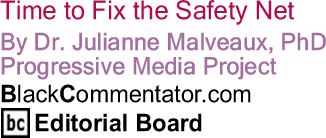
|
|||||||||||||||||||||||

|
|

Custom Search
|
|
 |
|
We need to repair our nation’s safety net. Back in 1996, President Clinton and Congress ended “welfare as we know it” and substituted it with TANF, Temporary Aid for Needy Families. They pushed TANF through in the middle of an economic expansion. Today, we’re in the midst of a severe recession, with double-digit unemployment rates afflicting blacks and likely to soon afflict the overall population. In this context, it’s hard to justify the five-year limit on aid that the TANF law imposes. States may elect to provide families aid for more than the cumulative 60 months, but the federal government limits the number of families who can be helped, and penalizes states if they offer too much aid. Before TANF, welfare recipients could also attend college to improve their skills before returning to the labor market. TANF limited college attendance and reduced vocational training to one year. These TANF provisions don’t seem realistic in the face of this recession, either. Congress reauthorized TANF in 2005, but the legislators kept its funding flat through 2010. This means we have a pre-recession level of assistance available in a recessionary time. That won’t do. People who found jobs before exhausting their 60 months of eligibility may have only a few months left, even as they are now losing their jobs. Others, who might ordinarily enter the labor market, have nowhere to turn for a job and have nothing to fall back on. Still others, who need public assistance and qualify for it, may not get it because the states don’t have the money to distribute it.
If numbers are the only measure, TANF was a stunning success, with the number of families on aid dropping for 10.3 million in 1997 to 4.3 million in 2006. But the numbers don’t tell all.
They don’t tell what happened to these people who fell off the rolls.
Today, even the most callous legislator would have a hard time making a moral argument against poor people, or those who have lost their jobs because our economy is tottering on the brink of disaster. Instead, we might explore the immorality of the Madoffs of the world (people you could not leave your cash with). The safety net we shredded more than 12 years ago would come in handy today as we deal with this recession. Without it, hundreds of thousands of families face hunger, hardship and homelessness. They not only need a safety net. They deserve one. This commentary originally appeared in The Progressive. BlackCommentator.com
Editorial Board Member, Julianne Malveaux is president of |
|
Any BlackCommentator.com article may be re-printed so long as it is re-printed in its entirety and full credit given to the author and www.BlackCommentator.com. If the re-print is on the Internet we additionally request a link back to the original piece on our Website. Your comments are always welcome. eMail re-print notice
If you send us an eMail message we may publish all or part of it, unless you tell us it is not for publication. You may also request that we withhold your name. Thank you very much for your readership. |
|
| |
|
| February
26, 2009 Issue 313 |
|
| Executive Editor: Bill Fletcher, Jr. |
| Managing Editor: Nancy Littlefield |
| Publisher: Peter Gamble |
| Est. April 5, 2002 |
Printer Friendly Version
in resizeable plain
text format or pdf
format. |
| Frequently Asked Questions |
 |

|
 |
 |
 |
| |
| |






























 In
the middle of an economic expansion, it was easy for our legislators
to engage in a moral argument about public assistance. Some portrayed
welfare recipients in the most contemptuous terms, as lazy and morally
inferior. Rep. E. Clay Shaw Jr., R-Fla., said they were people “you
wouldn’t leave your cat with.” Today’s recession mocks such scorn.
Millions of people need aid out of no fault of their own. The economy
has simply stopped working.
In
the middle of an economic expansion, it was easy for our legislators
to engage in a moral argument about public assistance. Some portrayed
welfare recipients in the most contemptuous terms, as lazy and morally
inferior. Rep. E. Clay Shaw Jr., R-Fla., said they were people “you
wouldn’t leave your cat with.” Today’s recession mocks such scorn.
Millions of people need aid out of no fault of their own. The economy
has simply stopped working.






